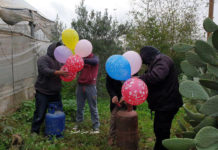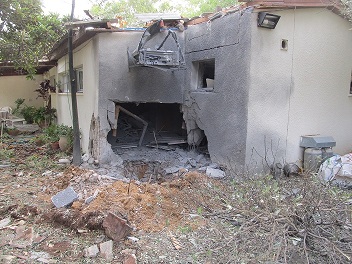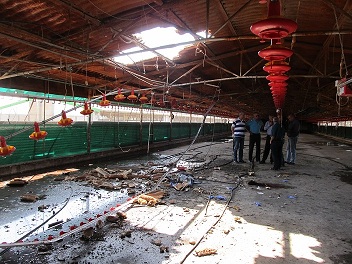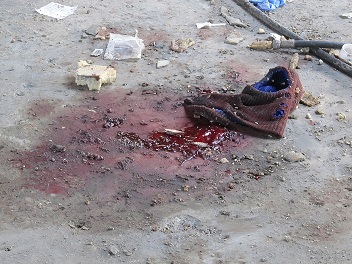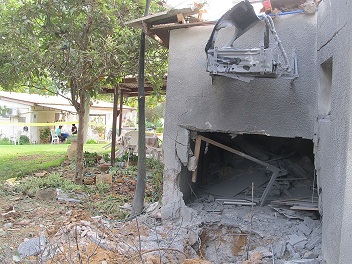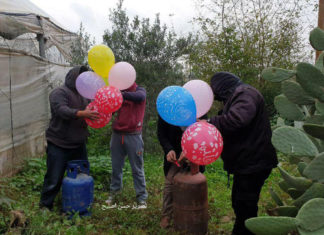Danny Dahan, head of the Sderot Business Association, remarked that
the level of frustration among residents in the Western Negev has
reached an all time high.
Photo:Direct hit by a missile in a house
In Danny’s words, “After 29,000 aerial attacks in ten years, we do not
see any light at the end of the tunnel”.
On the other hand, Danny Dahan said, pointing to Gaza, “The Gaza
economy is booming, Israel does nothing to stop the munitions supplies
to Gaza”. Dahan was referring to Israel continuing to allow hundreds
of trucks of supplies and the famous monthly Brinks cash vehicle to
Gaza. Dahan also referred to the fact that Israel does not kill Hamas
leaders who give orders to shoot, following the precedent set when
Israel killed Hamas leader Sheikh Yassin in 2004 years ago, with
little condemnation.
Dahan, like many other people in Sderot and the collective farms in
the area, also remarked that the people of Sderot feel isolated and
abandoned by fellow Israelis who live in the center of the country.
Dr. Adriana Katz, the director of the Mental Health Center for Sderot
and the Western Negev, observed this week that the population of
Israel in the south is not coping very well with the continuing
attacks. Dr. Katz reported that she has only three staff members to treat
more than 3,000 active cases of people experiencing extreme mental
health stress. Dr Katz’s appeals for more staff from the Israeli
government and international relief agencies have fallen on deaf ears.
Photo: Damage to chickencoop/ 3 injured
Yet millions of dollars have been pumped into Sderot and the Jewish
communities that are contiguous to Gaza for health, education and
social services. Why is their mental health center not seeing that
aid? No one in any governmental office will respond to that question.
You will not hear a word of criticism of the Israeli government or the
Israel Ministry of Defense from the mayors of Jewish communities that
border Gaza.
Three mayors with whom we spoke said, each of them in their own
nervous manner, that “it is not their job to criticize how the Israeli
defense establishment reacts to the Gaza attacks”.
The mayors would not comment on the decision of the Israel Defense
Department Civil Administration to continue to dispatch a monthly
Brinks cash vehicle which contains $13 million in cash dollars for
UNRWA in Gaza, even though the UNRWA administration in Gaza remains
totally under the control of the Hamas affiliated Islamic Bloc Trade
Union.
Israeli municipalities exist by the grace of the Israeli government
Israeli municipalities will not bite the hand that feed them.
Yet the Israeli government feeds the hand that bites them.
Israeli security sources report that Hamas simply takes the monthly
cash allocation to UNRWA and uses it to purchase munitions from the
Gaza tunnels.
No one in Israel’s defense establishment will explain why Israel
does not bomb ALL of munitions tunnels from Gaza.
A question most often asked is what people can to help the Jewish
communities who live under massive lethal attacks at this time.
The bottom line is for people who do not live in Israel’s pummeled
southern region, whether in Israel or abroad, to publicly raise their
voice and to show solidarity with the people of Sderot and the Western
Negev
Support could be characterized by vigils outside of Israeli consulates
and outside of media centers, to demand the following steps be taken
by the government of Israel
1. Allocation of funds to hire ten more mental health professionals at
the Sderot regional mental health center
2. Closure of ALL munitions tunnels into Gaza
3. Cessation of all cash deliveries to Gaza.
4. Execution of the Hamas leadership, applying the precedent of Sheikh
Yassin,
Now that Israel is about to embark on an election campaign, and with
the US in the final stages of its election campaign, it would be most
appropriate to ask these “four questions” of every politician, in the
weeks and months to come
The time has come to transform the “Gaza policy” into an election issue.
In the words of my mentor in community organizing, Prof. Eliezer
Jaffe “a problem is a problem when someone makes it into a problem”
Photo credit: Ronit Minaker, Spokesperson Eshkol Regional Council



